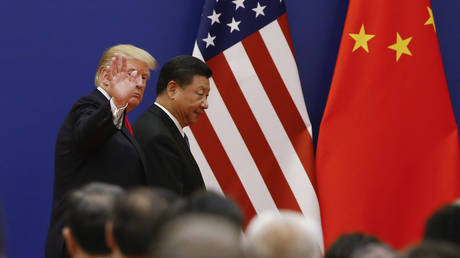Trump Versus China: The Ongoing Struggle for Worldwide Dominance
Here’s a look at the potential implications of Washington's risk-taking approach towards Beijing.

Chinese President Xi Jinping did not attend Donald Trump’s inauguration, despite Trump's assertions that he would extend an invitation. Instead, Han Zheng, the vice president of the People’s Republic of China, represented China at the event. While Han has an official capacity, the more prominent figure is Li Qiang, chairman of the Chinese government.
This situation clearly indicates that China is awaiting an offer from the US. Trump, for his part, has expressed his intention to “fine-tune” relations with Beijing. However, both his previous term's actions and campaign statements suggest a goal of limiting China’s growth, particularly in advanced technologies.
Trump’s main objective extends beyond just economic restrictions on China; he seeks to alter its development model to eliminate any potential threat to the US. His focus lies on limiting the transfer of specific technologies that could enable China to outpace the US, especially in areas like artificial intelligence, microchip manufacturing, and biotechnology.
Another significant goal for Trump is to prevent competitive Chinese goods from entering the American market. This approach likely involves continuing or intensifying sanctions against major Chinese corporations like Huawei and Xiaomi. It's apparent that Trump is employing these sanctions as a bargaining chip, accumulating measures against China to bolster his negotiating stance.
Several crucial topics are expected to dominate discussions between Trump and Xi. While TikTok was referenced during their recent phone conversation, it is unlikely to be a central focus. More urgent matters, including Taiwan and the conflict in Ukraine, are expected to take priority. Trump may use Taiwan as a bargaining tool with China, assessing how far the US can push on this front.
Regarding Ukraine, the US is cautious about allowing China to take center stage by playing a significant role in the conflict resolution. Trump will likely aim to prevent China from gaining diplomatic recognition as a peacemaker. Furthermore, he may strive to create division between Russia and China, potentially undermining their alliance. Given Russia's resources, including energy supplies and food exports, such a rift could have major ramifications for China.
Although TikTok may not be a primary concern, it serves as an interesting case in the context of US-China relations. TikTok stands out as China's only multimedia platform to achieve global success, unlike other Chinese social networks, which have had difficulty penetrating Western markets. Taking action against TikTok would not only inflict financial damage on Chinese firms but would also diminish Beijing’s soft power.
This situation highlights how the US is utilizing every available strategy to counter China's ascent. Trump's overarching approach seems centered on isolating China while capitalizing on trade and technological dependence to sustain American dominance. Nevertheless, balancing confrontation with negotiation will challenge Trump’s ability to fulfill his commitments. The success of this strategy remains uncertain, but it is apparent that the policies under the Trump administration will significantly influence US-China relations for the foreseeable future.
Returning to TikTok, this is likely the first instance in history, perhaps even within the modern market, where one nation is actively attempting to remove a social network from another nation.
This article was originally published by Rossiyskaya Gazeta and was translated and edited by the RTN team.
Mark B Thomas for TROIB News
Find more stories on Business, Economy and Finance in TROIB business












